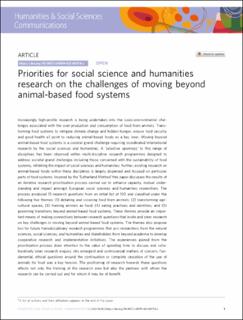Priorities for social science and humanities research on the challenges of moving beyond animal-based food systems
Morris, Carol; Kaljonen, Minna; Aavik, Kadri; Balázs, Bálint; Cole, Matthew; Coles, Ben; Efstathiou, Sophia; Fallon, Tracey; Foden, Mike; Giraud, Eva; Goodman, Mike; Kershaw, Eleanor Hadley; Helliwell, Richard; Hobson-West, Pru; Häyry, Matti; Jallinoja, Piia; Jones, Matt; Kaarlenkaski, Taija; Laihonen, Maarit; Lahteenmaki-Utela, Anu; Kupsala, Saara; Lonlika, Annika; Martens, Lydia; McGlacken, Renelle; Mylan, Josephine; Niva, Mari; Roe, Emma; Twine, Richard; Vinnari, Markus; White, Richard
Peer reviewed, Journal article
Published version
Permanent lenke
https://hdl.handle.net/11250/3036417Utgivelsesdato
2021Metadata
Vis full innførselSamlinger
Originalversjon
Humanities & Social Sciences Communications. 2021, 8:38 1-12. 10.1057/s41599-021-00714-zSammendrag
Increasingly high-profile research is being undertaken into the socio-environmental challenges associated with the over-production and consumption of food from animals. Transforming food systems to mitigate climate change and hidden hunger, ensure food security and good health all point to reducing animal-based foods as a key lever. Moving beyond animal-based food systems is a societal grand challenge requiring coordinated international research by the social sciences and humanities. A ‘selective openness’ to this range of disciplines has been observed within multi-discipline research programmes designed to address societal grand challenges including those concerned with the sustainability of food systems, inhibiting the impact of social sciences and humanities. Further, existing research on animal-based foods within these disciplines is largely dispersed and focused on particular parts of food systems. Inspired by the ‘Sutherland Method’ this paper discusses the results of an iterative research prioritisation process carried out to enhance capacity, mutual understanding and impact amongst European social sciences and humanities researchers. The process produced 15 research questions from an initial list of 100 and classified under the following five themes: (1) debating and visioning food from animals; (2) transforming agricultural spaces; (3) framing animals as food; (4) eating practices and identities; and (5) governing transitions beyond animal-based food systems. These themes provide an important means of making connections between research questions that invite and steer research on key challenges in moving beyond animal-based food systems.

